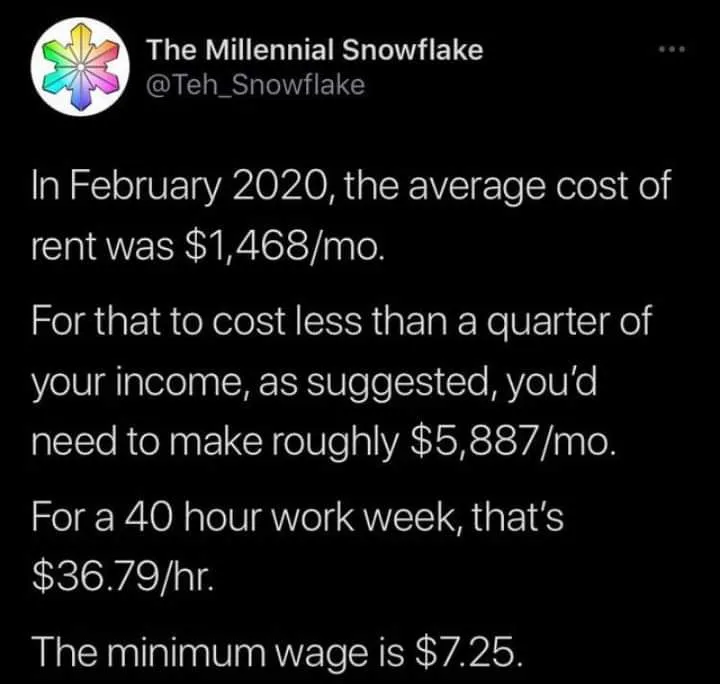
The Twitter screenshot above circulated through my Facebook feed recently, and it exemplifies some of the flaws commonly seen in arguments in economics and many other subjects. Whether you agree or disagree with someone, you want to address the argument instead of insulting the person or ascribing ill intent to their actions.
Mixing Metrics
Why jump from average rent to minimum wage? What is the average wage and minimum rent? These numbers don't necessarily mean anything when different measures are haphazardly brought up.
We also see lazy conflation of numbers in many other topics. Is a chart or table referring to raw numbers (Total X), per capita (X as a percentage of population as a whole), or per 100,000, for example?
Was a data selection cherry-picked to prove a point, or considered in full context with proper transparency? Graphs often skew one axis or the other into a narrow range or with uneven increments, or choose a start point that aligns with an agenda. For example, it is true that workplace injury and fatality rates improved after OSHA regulations were imposed, but what was the trend before legislative action, and what changes occurred in that trend following government intervention?
What Big Picture?
Why is the value of our money declining so fast that many people think there is a need to change price controls on wages? Why is the housing and rental market so volatile?
In another conversation, I saw discussion of how much prices have changed since pre-9/11 using fast food menus as a simple metric. I remember when we could buy five Arby's roast beef sandwiches for $5.00, or four beef and cheddar sandwiches at the same price. How much does one sandwich cost now at your location? Compare Big mags, Whoppers, or any other iconic menu item from any other national chain and see similar results.
We also see packaging change over time. A can or bag of a product you frequently buy may suddenly shrink while the price remains the same. Ingredients may change as well. Is it naked capitalist greed, or a rational response to some greater economic force resulting in a choice between raising prices, reducing quantity, or reducing quality?
The Seen and the Unseen
Have you ever tried to build a house or multi-family dwelling? I have participated in the process as an architectural draftsman. There are good construction principles, and then there is bureaucratic nonsense. There is accessibility, and then there are functionaries trying to justify their existence. Housing is also expensive in part because of factors like these.
Where most people see a problem in need of a new government policy, a little examination of the broader picture reveals a systemic problem with a deeper cause, and a history of past interventions exacerbating those root problems instead of fixing them. The Austrian Business Cycle Theory describes how inflation, interest rate manipulation, and other political interventions produce economic instability and drive the boom/bust business cycle plus describe how real estate markets are among the most impacted by such policies.
People see policy enactments. They don't see the up-front costs, opportunity costs, tax-funded enforcement costs, unfunded mandates, or other unseen consequences of the policy.
Responsibility or Dependency?
The easy answer is "let the government run things." It requires no intellectual or physical labor. Unfortunately, it also doesn't work. For more than a century now, we have seen the growth of central banks, the technocratic police state, corporate cronyism, massive wars, and worse economic chaos. The government can't fix this, because government is the root cause of these worsening conditions.
Is it any wonder governments fear the free flow of ideas and cryptocurrency over the internet without any regard for their regulations and borders? We're winning. The masses just don't realize it yet, and cling to the old fallacious arguments that created the status quo they rail against.
Am I missing something? Are my arguments also fundamentally flawed? Comment below! If you're not on HIVE yet, click here to join through PeakD.
Edited to fix typos. I hate writing posts on my phone because it's so much easier to mess up and so much harder to review for errors, plus the convenience adds a sense of casualness for me that lets me relax my attention. Oh, well.
